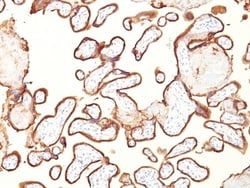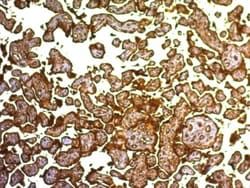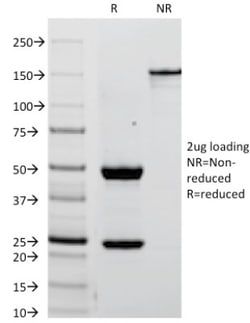Alkaline Phosphatase/ALPP Antibody (GM022), Novus Biologicals™
Manufacturer: Fischer Scientific
Select a Size
| Pack Size | SKU | Availability | Price |
|---|---|---|---|
| Each of 1 | NBP24495800-Each-of-1 | In Stock | ₹ 23,585.00 |
NBP24495800 - Each of 1
In Stock
Quantity
1
Base Price: ₹ 23,585.00
GST (18%): ₹ 4,245.30
Total Price: ₹ 27,830.30
Antigen
Alkaline Phosphatase/ALPP
Classification
Monoclonal
Concentration
0.2mg/mL
Dilution
Flow Cytometry 0.5 - 1 ug/million cells in 0.1 ml, Immunohistochemistry-Paraffin 0.25 - 0.5 ug/ml, Immunofluorescence 0.5 - 1.0 ug/ml
Gene Accession No.
P05187
Gene Symbols
ALPP
Immunogen
Recombinant human PLAP protein
Purification Method
Protein A or G purified
Regulatory Status
RUO
Primary or Secondary
Primary
Test Specificity
Reacts with a 70kDa membrane-bound isozyme (Regan and Nagao type) of Placental Alkaline Phosphatase (PLAP) occurring in the placenta during the 3rd trimester of gestation. It is highly specific for PLAP and shows no cross-reaction with other isozymes of alkaline phosphatase. Anti-PLAP reacts with germ cell tumors and can discriminate between these and other neoplasms. Somatic neoplasms e.g. breast, gastrointestinal, prostatic, and urinary cancers may also immunoreact with antibodies to PLAP. Anti-PLAP positivity in conjunction with anti-keratin negativity favors seminoma over carcinoma. Germ cell tumors are usually anti-keratin positive, but they regularly fail to stain with anti-EMA, whereas most carcinomas stain with anti-EMA. Anti-PLAP has been useful in the diagnosis of gestational trophoblastic disease
Content And Storage
Store at 4C.
Isotype
IgG2b κ
Applications
Flow Cytometry, Immunohistochemistry (Paraffin), Immunofluorescence
Clone
GM022
Conjugate
Unconjugated
Formulation
10mM PBS and 0.05% BSA with 0.05% Sodium Azide
Gene Alias
Alkaline phosphatase Regan isozyme, alkaline phosphatase, placental, alkaline phosphatase, placental (Regan isozyme), alkaline phosphatase, placental type, alkaline phosphomonoesterase, ALP, EC 3.1.3.1, FLJ61142, glycerophosphatase, PALP, Placental alkaline phosphatase 1, PLAP, PLAP-1, Regan isozyme
Host Species
Mouse
Molecular Weight of Antigen
70 kDa
Quantity
0.02 mg
Research Discipline
Cancer, Embryonic Stem Cell Markers, Ovarian Carcinoma Cell Markers, Stem Cell Markers
Gene ID (Entrez)
250
Target Species
Human
Form
Purified
Description
- Ensure accurate, reproducible results in Flow Cytometry, Immunohistochemistry (Paraffin), Immunofluorescence Alkaline Phosphatase/ALPP Monoclonal specifically detects Alkaline Phosphatase/ALPP in Human samples
- It is validated for Western Blot, Immunohistochemistry, Immunohistochemistry-Paraffin.




